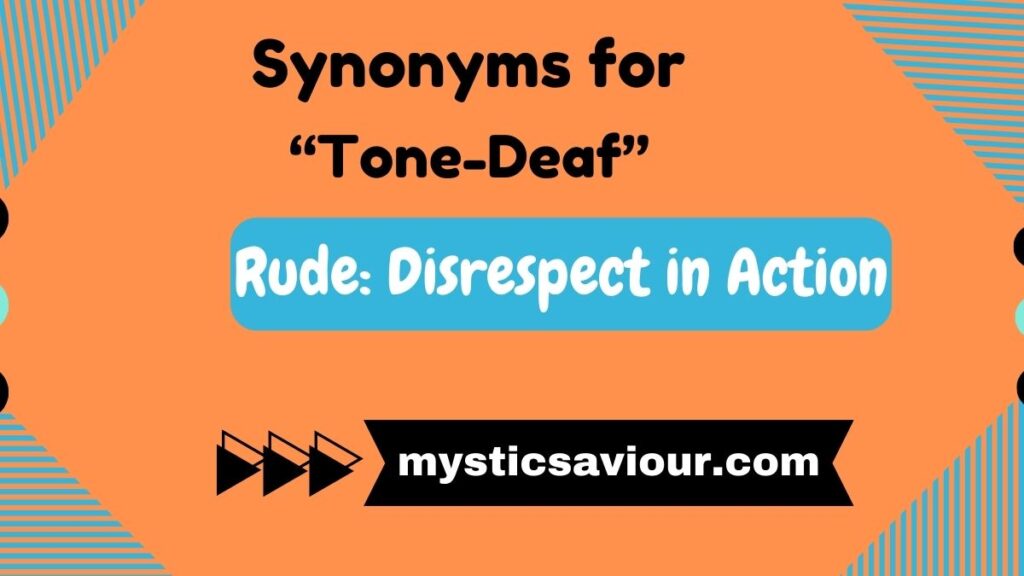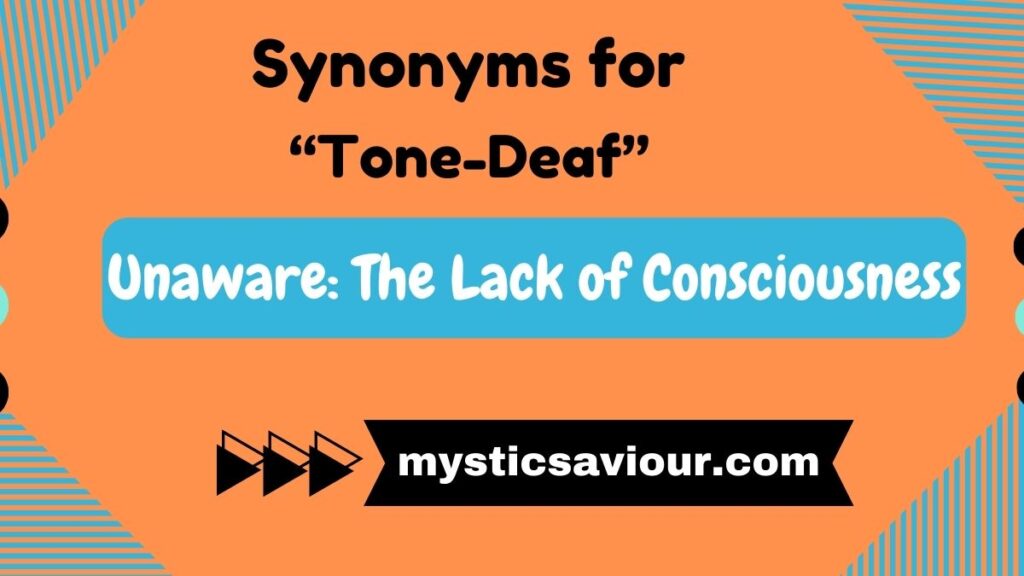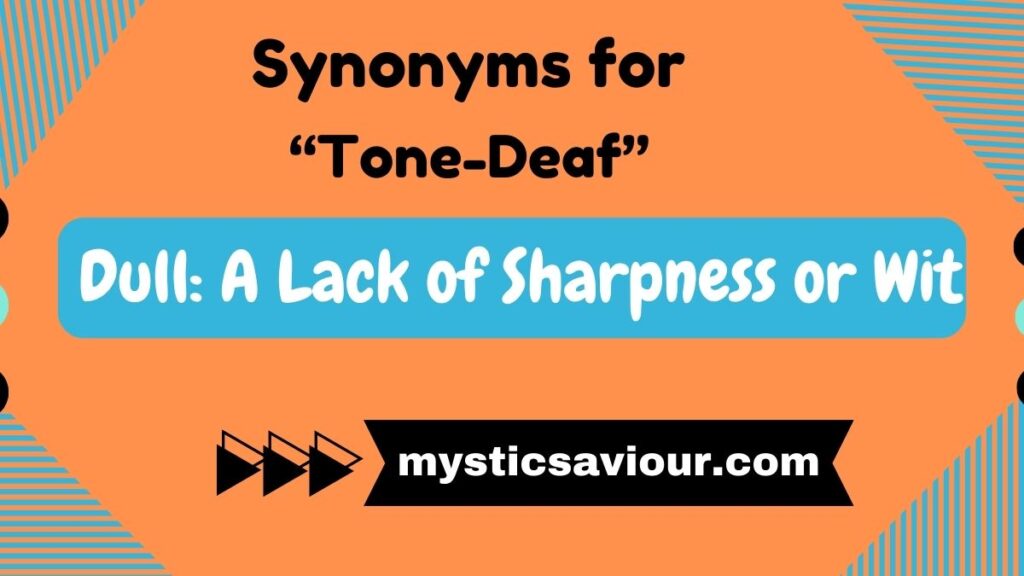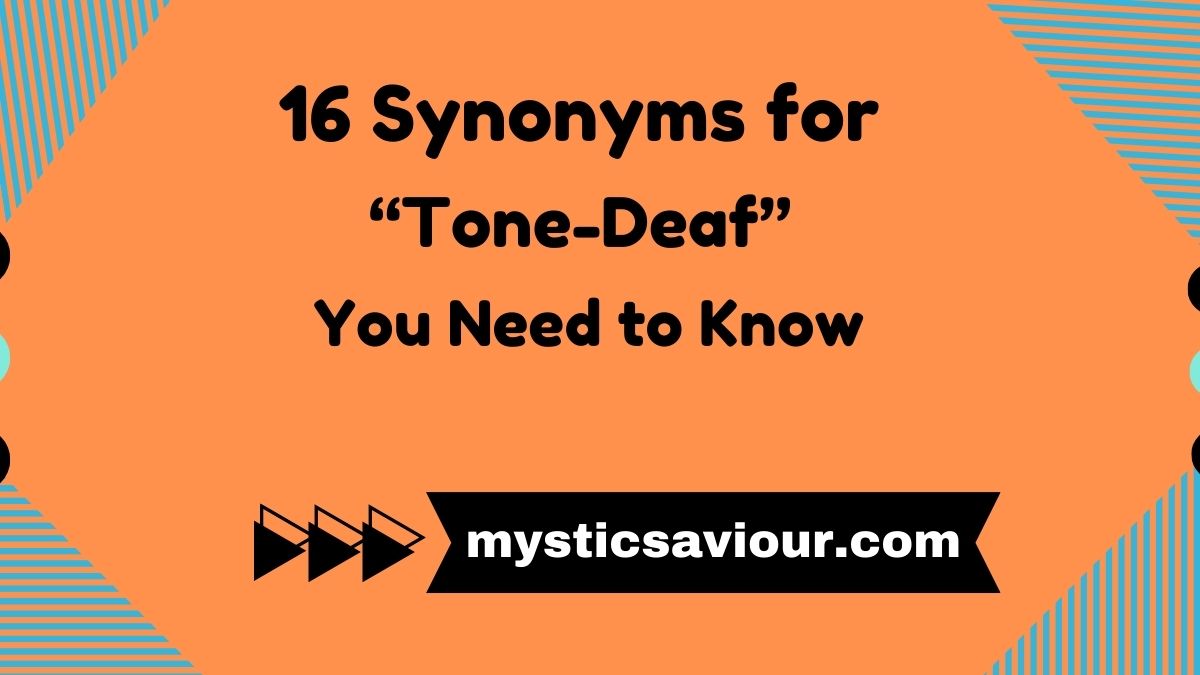Synonyms for tone deaf, “Tone-deaf” is a term that originally referred to an inability to perceive musical notes, but in communication, it describes someone who is oblivious to the emotional context or social cues around them. A tone-deaf person often makes remarks or takes actions that come across as insensitive or inappropriate, unaware of how they affect others. This behavior can create discomfort in conversations, whether personal or professional, and can often lead to strained relationships.
We’ve all encountered someone whose words or actions seem completely out of place in the given moment, leaving everyone else in the room feeling uneasy. It’s more than just a simple mistake; it’s a failure to tune into the nuances of social interaction. Understanding tone-deaf behavior and its synonyms can make it easier to identify and respond to these situations with more clarity.
In this article, we will explore 16 synonyms for tone-deaf that reflect the variety of ways someone can exhibit social insensitivity or a lack of empathy. Whether you’re navigating casual exchanges or professional environments, understanding these terms can sharpen your social awareness and help you communicate more effectively, fostering better, more positive interactions.
1. Insensitive: More Than Just Hurtful Words
When someone is described as insensitive, it means they lack awareness of how their words or actions might affect others. Insensitive behavior is often unintentional, but it leaves the person on the receiving end feeling overlooked, unimportant, or even hurt.
For example, consider a friend who cracks a joke about a sensitive issue—like someone’s recent breakup—without considering how it might feel to the person involved. That’s classic insensitivity at play. This term emphasizes the empathy gap that exists when someone fails to consider others’ feelings.
When to Use:
- Insensitive is ideal when someone behaves or speaks without regard to another person’s emotions.
Example:
“Her insensitive remark about my promotion felt like a slap in the face after all the hard work I put in.”
2. Rude: Disrespect in Action

At times, we label someone as rude when they show a lack of respect or fail to follow social etiquette. Unlike being merely tone-deaf, being rude often involves a more overt and deliberate action. Rudeness can be expressed through body language, tone of voice, or direct verbal insults, and it creates a barrier in interpersonal relationships.
Someone who cuts off others mid-sentence or makes harsh, unnecessary comments would likely be described as rude. This term, although close to insensitive, generally carries a more negative connotation.
When to Use:
- Use rude when there is clear disregard for basic social awareness or common courtesy.
Example:
“It was rude of him to leave the meeting without even saying goodbye.”
3. Inconsiderate: The Lack of Thoughtfulness
An inconsiderate person fails to take others’ feelings or needs into account. Unlike insensitive people, those who are inconsiderate don’t just ignore social norms; they actively show little regard for how their actions impact others. It could be something as simple as not acknowledging someone’s presence in the room or not being on time for an important event.
When to Use:
- Inconsiderate is a great word when someone is thoughtless in their actions or speech, often unintentionally.
Example:
“His inconsiderate behavior of using his phone during dinner made everyone uncomfortable.”
4. Unperceptive: Missed Cues and Social Signals
If someone is described as unperceptive, they’re often missing key social cues that would otherwise indicate how their actions are being received. Unperceptive people tend to overlook non-verbal signals such as body language or facial expressions. Their failure to notice these cues can lead to awkward or uncomfortable situations, as they remain oblivious to the reactions of others.
When to Use:
- Use unperceptive when someone consistently fails to notice or pick up on subtle emotional or social signals.
Example:
“She was so unperceptive to the tension in the room that she kept talking about the same issue over and over.”
5. Clueless: Complete Lack of Awareness
Being clueless means that someone has little to no understanding of what’s going on, especially when it comes to social awareness. The term “clueless” emphasizes an almost comical level of ignorance regarding situations or feelings. Clueless individuals may be unaware of a sensitive topic, failing to see that others around them are uncomfortable.
When to Use:
- Clueless works when someone is utterly unaware of their surroundings, usually in a way that is both humorous and frustrating at the same time.
Example:
“He was clueless about the office dynamics, constantly interrupting and talking over people.”
6. Unaware: The Lack of Consciousness

Unaware refers to a complete lack of knowledge or consciousness about something, particularly in terms of social awareness. This term suggests that the person is simply missing the information that would make them sensitive or considerate.
For instance, a person who doesn’t realize they’re dominating a conversation might be described as unaware of their social surroundings.
When to Use:
- Use unaware when someone doesn’t realize how their actions or words are being perceived.
Example:
“She was unaware that her constant talking was annoying the rest of the group.”
7. Oblivious: A Total Lack of Awareness
Oblivious takes unaware to the next level, suggesting that a person not only misses social cues but is completely blind to the impact of their behavior. Oblivious individuals might not notice when others are upset or failing to pick up on verbal and non-verbal signals.
When to Use:
- Use oblivious when someone is entirely unaware of their surroundings and seems indifferent to others’ feelings.
Example:
“He was oblivious to the fact that his comments were making people feel uncomfortable.”
8. Indiscreet: When Discretion Is Absent
Being indiscreet involves a lack of tact or discretion, often resulting in inappropriate comments or actions. This term is commonly used when someone reveals sensitive information or makes embarrassing statements without considering the consequences.
When to Use:
- Use indiscreet when someone acts without discretion or makes remarks that should have been kept private.
Example:
“Her indiscreet comment about the new employee’s personal life made everyone feel uncomfortable.”
9. Unsympathetic: A Lack of Compassion
When someone is unsympathetic, they show little to no understanding or empathy for the pain or struggles of others. Unlike rude or insensitive, unsympathetic refers specifically to someone’s inability to connect with or care about another’s emotional state.
When to Use:
- Unsympathetic works when someone fails to express or feel empathy toward others in difficult situations.
Example:
“His unsympathetic response to her grief only deepened her sorrow.”
10. Inattentive: A Failure to Focus on Others
Inattentive people are often distracted and miss important details. This term refers to a lack of focus or concentration, particularly when it comes to listening or understanding another person’s needs or emotions. Inattentive behavior can happen when someone’s mind is elsewhere, causing them to overlook important aspects of social interaction.
When to Use:
- Use inattentive when someone fails to pay attention, either in a conversation or a specific task.
Example:
“He was so inattentive during the presentation that he missed the key points being made.”
11. Unthoughtful: A Lack of Consideration
To be unthoughtful means to act without considering how others will be affected. It could be saying something hurtful without realizing it or failing to acknowledge someone’s feelings when making decisions. Unthoughtful individuals often act out of habit or convenience, not thinking about the broader impact on others.
When to Use:
- Use unthoughtful when someone acts in a way that reveals a lack of care for others’ feelings or situations.
Example:
“His unthoughtful remarks about her appearance made everyone uncomfortable.”
12. Uncaring: A Cold, Distant Attitude
When someone is uncaring, they show no interest or concern for others’ well-being. This term emphasizes an emotional distance and a lack of kindness or compassion.
When to Use:
- Uncaring is best used when someone is completely indifferent to the emotions or needs of others.
Example:
“Her uncaring behavior toward the homeless man outside the store made her look heartless.”
13. Impolite: A Simple Lack of Courtesy
Being impolite refers to behavior that disregards basic social etiquette and norms. Impolite individuals are typically disrespectful in a direct way, like interrupting others or speaking without proper manners.
When to Use:
- Use impolite when someone breaks common courtesies or behaves in a manner that offends others.
Example:
“It’s impolite to start talking before someone finishes their sentence.”
14. Inept: Clumsy in Communication
When someone is inept, it usually refers to a lack of skill or ability, often in communication. Inept individuals struggle to understand social cues and often make awkward mistakes. They may try to contribute to a conversation but fumble, making everything feel more uncomfortable than it should.
When to Use:
- Inept is ideal for describing someone who is socially or emotionally clumsy in their interactions.
Example:
“His inept attempt at an apology only made the situation more awkward.”
15. Tone-Deaf
At its core, being tone-deaf refers to the inability to perceive or respond to the emotional nuances in communication, leading to remarks or actions that are socially inappropriate. The term often suggests that someone is unaware or insensitive to the feelings of others, especially when they fail to adjust their communication based on context.
When to Use:
- Tone-deaf works when someone clearly fails to adjust their approach to align with the mood or sensitivities of a given situation.
Example:
“Her tone-deaf attempt at humor offended the whole room.”
16. Dull: A Lack of Sharpness or Wit

Dull can refer to someone whose communication lacks precision, sharpness, or understanding. They often fail to recognize the subtleties of social exchanges and present comments or opinions that seem flat or lack vibrancy.
When to Use:
- Dull works when someone is bland in their speech or interactions, without any awareness of the social dynamics at play. synonyms for tone deaf
Example:
“His dull response to the lively conversation made everyone lose interest.”
Conclusion
In conclusion, understanding the 16 synonyms for “tone-deaf” you need to know can greatly improve your communication skills. These words help you describe situations where people fail to pick up onsynonymssocial cues or seem insensitive to others’ feelings.tone-deaf By recognizing these behaviors, you can navigate conversations more thoughtfully and respond with greater empathy.
Being aware of these 16 synonyms for “tone-deaf” you need to know allows you to express yourself more clearly. Whether you are talking to friends, colleagues, or clients, using the right words to describe insensitive behavior helps tone-deaf build better relationships. synonyms It’s a small change that can make a big difference in how you connect with others.

Sophie Bell is a creative writer at Mystic Saviour, specializing in Word Mechanics, Name Narratives, and Linguistic Twists. She brings a passion for language and storytelling, helping readers explore unique and engaging ways to enhance their writing.









